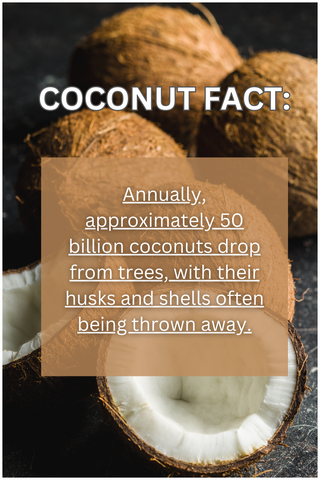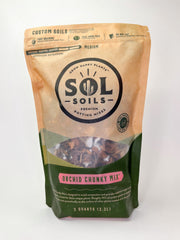Coconut Husk: Exploring the Benefits of Using Coconut Husks for Your Plants
Coconut Husk
Indoor gardening is a thriving trend that combines the beauty of nature with the comfort of home. As plant enthusiasts seek sustainable and efficient ways to nurture their indoor green companions, one particular material is gaining attention for its remarkable benefits: the coconut husk. This versatile by-product of the coconut industry is not only eco-friendly but also beneficial for plant health. In this article, we'll discuss all things coconut, including the benefits and different husk uses. Let’s explore how it can enhance your gardening!
What is a Coconut Husk?
Coconut husks are the fibrous outer layer of the coconut itself and have been traditionally regarded as a waste product and would typically be burned and then sent to landfills. However, it is now being repurposed in various industries, including horticulture. These husks can be processed into multiple forms such as coconut husk chips, coconut fiber, and coir pith. Each of these forms of the husk has its own benefit, making this material a versatile component for different gardening needs. Let’s dig deeper into the benefits, shall we?
Benefits of Utilizing Coconut Husks With Your Houseplants
Enhanced Soil Aeration: The fibrous nature of coconut husks creates a loose and airy growing medium. This structure promotes better oxygen flow to the plant roots. Therefore, reducing the risk of root rot and fostering healthy root development. If you have read our previous blogs you know what we always say: healthy roots = healthy plants!
Improved Water Retention and Drainage: Coco husks have a unique ability to retain moisture while also draining excess water effectively. This balance makes sure the plant roots receive adequate moisture without becoming waterlogged. This is particularly beneficial for indoor plants that can be susceptible to overwatering. This material stores a more appropriate amount of moisture (~10x its own weight) indoors than peat moss does (~20x its own weight as a soil component). Overwatering can lead to root rot and other plant health problems.
Natural Pest Repellent: The fibrous nature of coconut coir is inherently a touch resistant to moisture retention compared to common alternatives. This reduces the risk of bacterial and fungal growths that can lead to soil-borne diseases. These diseases could cause stunted growth, reduced yields or even kill the plant. Moreover, the physical structure of coco husk is less appealing to common pests, providing a degree of protection for plants against unwanted invaders.
Eco-Friendly and Sustainable: Husks are a by-product of the coconut industry (think: coconut oil or milk for food or beauty products) and are abundant in tropical countries. This makes the husk of the coconut readily available and therefore represents a renewable resource that can be utilized without significantly impacting the environment. This is a different story than another popular organic material used in horticulture: peat moss. Peat moss is harvested from peat bogs that take centuries to form and play a critical role in carbon sequestration, biodiversity, and water filtration. The typical rule of thumb used is that they only grow about 1mm a year, which is why it takes such a long time to get back to baseline. To play Devil's Advocate, I do want to call out that the majority of peat bog territory across the globe is already protected from farming, which is a great thing! By utilizing alternatives like coconut fiber husk, it helps reduce waste, conserve non-renewable resources, and support sustainable agricultural practices.
Re-wetting Capacity: Husks can be rehydrated after drying out, unlike peat moss-based mixes that can become hydrophobic and difficult to moisten. (Peat has been known to shrink and pull away from the planter walls when dry, which can lead to water running off the surface or around the edges without actually soaking into the medium where the roots reside). This re-wetting feature of the husk is particularly beneficial for plants grown indoors or in containers, where maintaining consistent moisture levels is critical. The coco fiber enhances air porosity and water retention, which helps with moisture distribution and reliable access for plant roots.
Neutral pH Level: Coconut husk fiber generally has a near-neutral pH level, making it suitable for a wide variety of indoor plants. This reduces the need for pH adjustments and makes it a versatile medium for plant growth.
Durability: The fibers in coconut husks are naturally tough and slow to decompose. This means they maintain their structure for longer periods, reducing the need for frequent repotting or medium replacement.
Lightweight: Coco husk products are relatively light, making them easy to handle and ideal for indoor settings where heavy pots can be a concern.
How to Use Coconut Husk for Plants
Potting Mix: If you are looking for a potting mix that has great aeration and water retention, utilizing a soil that contains the husk of coconut is a great option. This kind of mix is ideal for plants that thrive in well-drained and moisture-retentive soil.
In Hydroponics: The fibrous texture of the coco husk provides the necessary support for plant roots to anchor and grow. The husks can also be used multiple times, which helps cut down costs and is a more sustainable choice.
What Plants Thrive with Coconut Husks in Their Soil?
Orchids:
Orchids thrive in airy, well-draining conditions, which coconut fiber provides. It's an excellent medium for orchid types that require good root ventilation and moisture without waterlogging.
Ferns:
Ferns love moist environments and the coco husk’s ability to retain water and drain the excess makes it a great fit.
Succulents and Cacti:
Soil containing coconut chips creates a wonderful balance of moisture retention and drainage that succulents and cacti need in order to prevent root rot.
Vegetable Gardens:
Many vegetables, like tomatoes, cucumbers, and peppers, benefit from the water retention and aeration properties of coconut fiber. When mixed with garden soil this can lead to healthier plants and improved yields.
Leafy Houseplants like Aroids:
The addition of coconut husk chips can be beneficial to plants that prefer well-draining soil but also need consistent moisture, such as Hoyas, Spider Plants, and Aroids (i.e.- Philodendron, Monstera, Anthurium, Alocasia, Aglaonema, Peace Lily, etc.).
Seedlings:
Coconut fiber is an excellent medium for germinating seeds. It's sterile, meaning it won't come with pathogens that could harm young plants, and it retains moisture while also providing good drainage. This creates an ideal environment for seedlings to develop strong root systems.
Container Plants:
The addition of husk chips in your container plants has several benefits. Besides the obvious water retention and aeration, the husks also help prevent the compaction of soil in the pot. This aids in better root health.
Conclusion
The coconut husk, in all of its many forms, offers a plethora of benefits that should not be overlooked. Its water retention, aeration properties, and sustainability make it an excellent choice when it comes to creating a thriving indoor garden. When you choose a soil that contains any form of coconut, you’re not only helping your plants, you’re taking steps to a healthier planet.
So, the next time you are planning your indoor garden, consider potting mediums utilizing coconut, and Grow Happy Plants!





